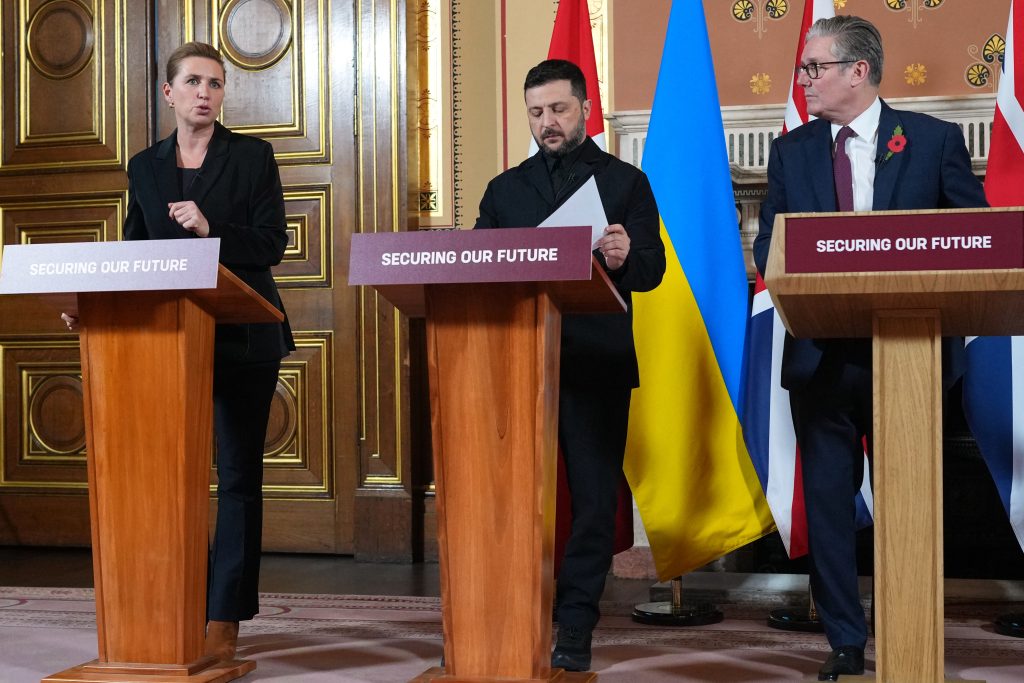British Prime Minister Keir Starmer on Friday urged allies to “finish the job” on Russian assets as he told Ukraine’s President Volodymyr Zelensky in London there was more that they could do to bolster Kyiv’s long-range missile capability.
Starmer met Zelensky at his London residence before holding talks with Ukraine’s key backers.
“I think there’s further we can do on capability, particularly… long-range capability, and of course, the vital work for coalition of the willing when it comes to the security guarantees that are necessary,” the UK leader said.
On Russia’s sovereign assets he said he would like to see countries finish what had been started and unlock funding to support Ukraine.
“The UK is ready to move in tandem with the EU (European Union) to drive this forward as fast as possible, to get those funds flowing to Ukraine,” he said.
The United States and EU have both announced new sanctions this week on Russian energy, aimed at crippling its war economy.
EU leaders also took steps towards funding Ukraine’s defence for another two years, although they stopped short of approving a mammoth “reparations loan” backed by frozen Russian assets.
Starmer hugged Zelensky as the Ukrainian president arrived in Downing Street telling him this week had seen “huge steps forward”.
NATO Secretary General Mark Rutte, Denmark’s Prime Minister Mette Frederiksen and the Netherlands’ Dick Schoof were in London while other leaders including French President Emmanuel Macron joined online.
Earlier Friday Zelensky held after another meeting with Britain’s King Charles III — their third this year.
Belgian objection
The latest diplomatic activity followed Zelensky’s visit to Washington last week, when President Donald Trump rebuffed his pleas for long-range Tomahawk missiles to hit targets deep inside Russia.
The near four-year war continues to grind on despite US and European efforts to force Russian President Vladimir Putin to the negotiating table, with Moscow battering Ukraine’s energy grid this week in deadly drone and missile attacks.
The meeting came a day after EU leaders tasked the European Commission to move ahead with options for funding Ukraine for two more years, leaving the door open for a 140-billion-euro ($162 billion) “reparations loan”.
The EU froze around 200 billion euros of Russian central bank assets after Moscow’s tanks rolled into Ukraine, and the European Commission has proposed using the funds to provide a huge loan to Kyiv — without seizing them outright.
But the plan has faced strong objections from Belgium, where the bulk of the frozen Russian assets are held, over the legal consequences.
The broadly worded conclusions of Thursday’s summit in Brussels — adopted by all member states except Hungary — did not mention the loan directly, instead inviting the commission “to present, as soon as possible, options for financial support”.
Failure in Alaska
Zelensky nonetheless welcomed the outcome as a signal of “political support” for the notion of using Russian assets to keep Kyiv in the fight.
He has been pleading for weeks for more long-range weapons, hoping to capitalise on Trump’s growing frustration with Putin after a summit in Alaska failed to yield a breakthrough.
But the Ukrainian leader left Washington empty-handed last week as Trump seemed to eye a fresh diplomatic breakthrough instead, on the back of the Gaza ceasefire deal.
The UK and France already supply Ukraine with Storm Shadow and Scalp long-range missiles, while Ukraine also produces its own Flamingo and Neptune missiles.
Kyiv is particularly keen to get the German equivalent Taurus missiles, a move Berlin has long resisted over fears that it would cause tensions with Russia to further escalate.
On Friday, Starmer also announced the “acceleration” of a programme to manufacture air defence missiles, which aims to supply Ukraine with more than 5,000 such weapons.
Around 140 “lightweight-multirole missiles” will be delivered to Ukraine this winter, according to Downing Street.
The post Allies should boost Ukraine’s long-range missile reach – UK appeared first on Vanguard News.

